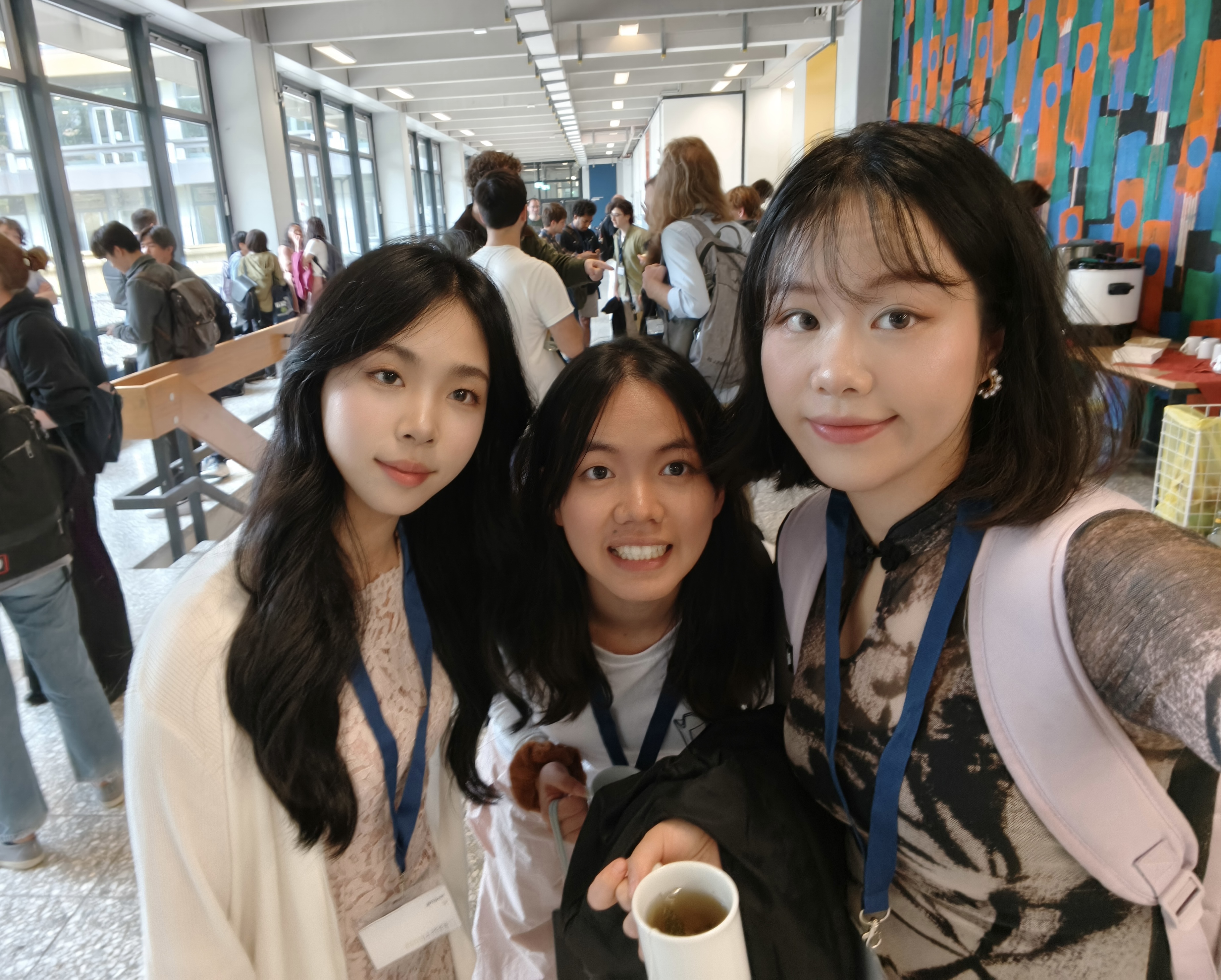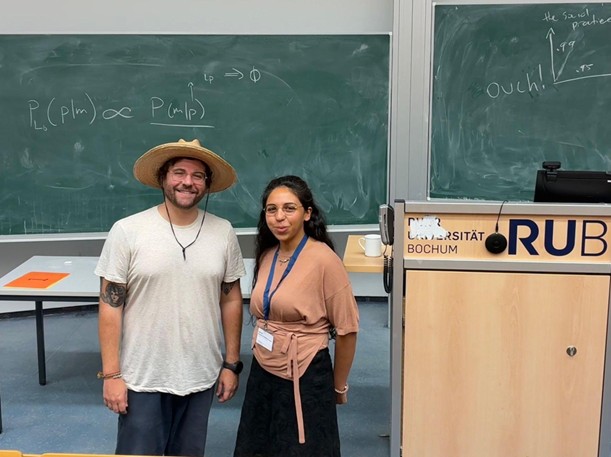Vom 28. Juli bis 08. August 2025 fand die 36th European Summer School in Logic, Language and Information (ESSLI 2025) an der Ruhr-Universität in Bochum statt. Die GSCL förderte die Teilnahme von drei Promovierenden durch Vergabe von Konferenz-Stipendien. Nachfolgend berichten die Begünstigten ihre Eindrücke von der Veranstaltung:
Tobias Leopold
The ESSLLI is a summer school that encompasses the domains of logic, language, and computation, as well as their intersections. Each year, a different university hosts the school. This year’s ESSLLI was held on the expansive grounds of the Ruhr University Bochum. The summer school offers a comprehensive curriculum, comprising four lectures daily over a two-week period. This format provides a diverse range of topics, both advanced and introductory. I thoroughly enjoyed the abundance of lectures and gained insights into novel and innovative approaches across various disciplines. It is particularly engaging to observe the research interests of the lecturers, contemplate the arising questions, and explore the methodologies employed. While the lectures are undoubtedly the primary attraction of ESSLLI, the opportunities for interdisciplinary dialogue are equally valuable. The diverse academic backgrounds and interests of the fellow participants, stemming from the broad profile of the summer school, foster a rich and productive exchange. On the one hand, I gained valuable insights from conversations with my colleagues during the interludes between lectures. On the other hand, it is highly motivating to engage with individuals who share my interests and inspiring to interact with those whose interests differ from mine. During my two weeks at ESSLLI, I had the pleasure of meeting some of my future colleagues in the master programme and encountering numerous other exceptional individuals whom I anticipate encountering at a future ESSLLI. Overall, the event was meticulously organised. Between lectures, refreshments such as snacks and coffee were provided, facilitating a lively exchange between students and lecturers. The university’s location outside the city, surrounded by nature, enables a quick respite from the academic exchange and an opportunity to stroll through the university’s beautiful botanical garden. In conclusion, I express my sincere gratitude to GSCL for providing financial support and facilitating my attendance at ESSLLI.
Yuan Yu
Dank der großzügigen Unterstützung durch die GSCL Fee Waivers konnte ich an der ESSLLI 2025, der 36. Europäischen Sommerschule für Logik, Sprache und Information, in Bochum teilnehmen – als Student der Computerlinguistik an der Universität Zürich. Diese Förderung verwandelte eine entfernte Möglichkeit in zwei intensive und inspirierende Wochen, in denen ich Kurse und Vorlesungen besuchte, die mir zuvor unbekannt waren, in denen ich sowohl akademisch als auch persönlich Fortschritte machte und meinen Horizont nachhaltig erweiterte.
In der ersten Woche legte ich ein solides Fundament für sorgfältige und reproduzierbare Arbeit. In der Vorlesung Foundations of Linguistic Data Science lernte ich beispielsweise, den gesamten text-as-data-Workflow zu durchlaufen – von fundierter Stichprobenziehung und gründlicher Vorverarbeitung bis hin zu Modellierung und ehrlicher Evaluation – und dabei klare Protokolle zu führen, sodass Ergebnisse reproduzierbar und überprüfbar bleiben. In Structured and Unstructured Data erkannte ich, wie Ontologien, RDF/OWL-Reasoning und SPARQL komplexe Fragen beantwortbar und prüfbar machen und wann sich Wissensgraphen sinnvoll mit Sprachmodellen kombinieren lassen. In Language Model Programming begann ich, LLMs als programmierbare Systeme zu behandeln, indem ich deklarative Einschränkungen und imperative Steuerungen (einschließlich DSL-ähnlicher Prompts) nutzte, um Pipelines systematischer zu entwerfen, zu testen und zu dokumentieren. Und im Abendkurs zu Spatial Gesture Semantics übernahm ich einen einfachen, überprüfbaren Ansatz zur multimodalen Bedeutung, der Gesten auf einer visuell-räumlichen Ebene mit klaren Annotationsregeln hält und mir hilft zu unterscheiden, was Gesten und was Worte beitragen.
Die zweite Woche führte mich tiefer in spezialisiertere Themen. Ein Workshop zum Lesen von Konkordanzen vermittelte mir transparente Methoden, um KWIC-Zeilen auszuwählen, zu sortieren und zu gruppieren. Eine Vorlesung zu Syntax und statistischer Semantik mit dem Modal Lambek Calculus zeigte mir, wie formale Beweise als Rezepte für kompositionelle Bedeutung dienen und mit distributionsbasierten Modellen verbunden werden können. In der Vorlesung über Opinion Mining und Social-Media-Analyse lernte ich, warum Annotationsdesign und klare Unterscheidungen zwischen Sentiment, Emotion und Haltung für robuste Modelle unverzichtbar sind. Ein Kurs zu Linguistik, NLP und politischer Kommunikation verband Topoi und persona-basierte Argumentationsmuster mit empirischen Social-Media-Pipelines.
Neben den regulären Veranstaltungen bot das Programm auch interessante Student Sessions und Abendvorträge. Die studentischen Beiträge – etwa zu Diskurs und gemeinsamem Hintergrundwissen sowie zur Semantik des epistemischen must – zeigten mir, wie man klare Fragestellungen formuliert und sie mit transparenter Analyse untermauert. Auch die Abendvorträge erweiterten mein Denken, etwa einer, der episodisches Gedächtnis als strukturierte Repräsentation neu deutete. Besonders eindrucksvoll war die Beth Dissertation Prize Award Ceremony, die herausragende Dissertationen in den Bereichen Logik, Sprache und Information auszeichnet und mir alternative logische Grundlagen eröffnete. Außerhalb der Vorlesungen und des Programms knüpfte ich Freundschaften mit Studierenden, Promovierenden und Dozierenden aus vielen Ländern, tauschte Ideen beim Abendessen aus und erkundete das Ruhrgebiet – vom Deutschen Bergbau-Museum und der Essen Pride Demonstration bis zu den Kathedralen in Aachen und Köln.
Rückblickend tat die Unterstützung durch GSCL weit mehr, als nur eine Teilnahmegebühr abzudecken – sie öffnete mir eine Tür zur Computerlinguistik. Vorlesungen, von denen ich zuvor nur gehört hatte, wurden zu Dingen, die ich tatsächlich anwenden konnte, und die Autorinnen und Autoren der Arbeiten wurden zu Mentorinnen, Mentoren und Peers. Die Erfahrung legte ein dauerhaftes Fundament für meine kommenden Semester und meine Bachelorarbeit. Ich kehrte zurück mit Methoden, denen ich vertraue, Materialien, die ich wiederverwenden kann, und einem klaren Plan, wie ich Projekte verantwortungsvoll aufbauen möchte. Ich bin GSCL zutiefst dankbar, dass sie dies möglich gemacht haben. ESSLLI war weit mehr als eine Sommerschule – sie stattete mich mit neuen theoretischen und methodischen Werkzeugen aus und stärkte mein internationales Netzwerk.

Zum Schluss möchte ich GSCL noch einmal herzlich danken, dass Sie mir diese Möglichkeit gegeben haben. Sie wurde für mich zu einer Quelle nachhaltigen Wachstums und zu einem Weg, den ich nun entschlossen weitergehen werde.
Gabriela Ferreira de Medeiros Younes
Thanks to a Konferenzstipendium awarded by the Gesellschaft für Sprachtechnologie und Computerlinguistik (GSCL), I had the opportunity to attend and participate in the 36th European Summer School of Logic, Language and Information (ESSLLI), which took place at Ruhr Universität Bochum from July 27 to August 8.
As an undergraduate student of Computational Linguistics at the Complutense University of Madrid, this was my very first ESSLLI, and I could not have imagined how much the experience would shape my learning and my perspective on research. My initial goals before starting the summer school were modest. On the one hand, to find inspiration to carry out my first research projects, particularly my undergraduate thesis that I will have to present next June; on the other hand, I was excited to take part in courses taught by professors and scholars whose work I had been reading attentively over the past year and on which I had based my first scientific contributions. Likewise, I found it highly stimulating to be in a deeply interdisciplinary environment, where I could interact, share ideas, and learn from specialists in Computer Science, Mathematics, Logic, and Philosophy of Language – venues that, unfortunately, are not so common in my country. Well, all my expectations were surpassed, and by far.
During the first week, I focused mainly on courses in semantics and pragmatics. Jessica Mendes and Paolo Santorio’s class on Counterfactual and Predictive Modality opened up new ways of thinking about the relationship between will and would. Mendes focused on the predictive values of will, while Santorio examined the counterfactual values of would. The discussion included the “Past as Tense” versus “Past as Modality” debate, X-marked modality, and typological generalizations across languages such as Portuguese and Hungarian. I found especially stimulating the notions of historical alternatives and temporal shifts and I left with a long reading list and also topics I want to explore further, such as the syntax of modal semantics, and how mood competition would work in Spanish. Robert Henderson’s Foundations of the Common Ground was another highlight that explored the central role of common ground in pragmatics. Starting from Lewis and Stalnaker, we examined classical and modern accounts of presupposition and assertion, before moving to Gunlogson’s informational models and the influential Farkas & Bruce framework. Later sessions engaged with cognitive models, particularly the recent work of Rubio-Fernández & Harris (2025). Henderson’s clarity and formal rigor definitely stood out. In the future I would like to connect these insights with Relevance Theory and questions about how interlocutors generate common ground iteratively.
In the second week, my attention shifted towards courses with a more computational and applied dimension. I attended Introduction to Proof Theory (Abishek De and Iris van der Giessen). Unlike a previous overwhelming experience with Deep Inference, this course offered me a clear introduction to Proof Theory as a foundation of Mathematics, connecting lambda calculus, natural deduction, and their impact on programming languages and formal semantics. Omnia Zayed’s class on Opinion Mining and Social Media Analysis was remarkably meaningful for me, because it allowed me to combine my skills in programming and NLP with my academic interest in discourse modeling and social applications of language technology. I left the course with a clear sense that this is a direction I want to pursue further.
Two other courses deserve special mention. The first was Robert Henderson’s advanced seminar on Dogwhistles at the Intersection of Semantics, Pragmatics and Social Meaning. Having worked on this topic myself over the past year, I felt truly at home in the discussions. It was a unique opportunity to exchange ideas, test hypotheses, and think about future directions with a leading scholar in the field. The second was Linguistics and NLP in Political Communication, taught by Asad Sayeed and Ellen Breitholtz. This course was closely aligned with the ones I had been taking this second week, and tackled experiments I have been replicating. Its significance laid in the way it developed into a genuinely collaborative setting, with professor Henderson contributing to the discussion and all participants examining dogwhistles and other social and political phenomena from distinct yet complementary perspectives.
But ESSLLI was not only about courses. The extraordinary evening lectures were an intellectual highlight on their own. Among them, I would especially like to mention Kristina Liefke’s talk on implementing formal semantics for episodic memory, and Phokion G. Kolaitis’s lecture on computational social choice, which brilliantly connected database theory and possible worlds.
Equally inspiring were the student sessions, where we could exchange ideas more informally. These meetings became a true nucleus of interaction, where we all had the chance to discuss our interests openly with peers from all over the world. Overall the encouraging protagonism of students in ESSLLI was something I did not expect and it constituted a great surprise.
And of course, the social activities made the experience even more memorable. I particularly enjoyed exploring the campus and the city, including the spectacular botanical garden of Ruhr Universität Bochum. The social dinner outdoors where we tasted delicious Currywurst (with vegetarian and vegan options) was a moment of joy and community, especially since the rain finally gave us a break that evening. On top of that, we had the chance to explore the region: I fondly remember the Saturday trip to Köln with a group of fellow students, which was the perfect time for getting to know the place and each other.
Leaving Bochum, I felt both intellectually exhausted and energized. ESSLLI gave me much more than I expected: not only knowledge and skills, but also inspiration, motivation, and amazing new colleagues. I heard probably Tatjana Scheffler, chair of the summer school, say that the connections forged at ESSLLI are life-long, and I hope they are. For now, I am definitely looking forward to next year’s meeting in Prague. It was a privilege to spend two weeks surrounded by people who share the same passion, and I know the lessons and connections from this summer school will continue to shape my academic journey for years to come. Special acknowledgements to GSCL for the given opportunity.

